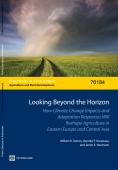The report provides recommendations to develop and implement policy reforms supporting market formation and fostering a favorable climate for investments in the sectors of energy efficiency and renewable energy sources.
This wide-ranging regional assessment is based on case studies, expert workshops and senior policy maker seminars. It encourages policy makers to focus on: “quick wins” to demonstrate rapid results and increase political support through those measures that can be introduced in less than a year and are likely to produce significant impact at moderate costs; “essentials” as the backbone of a comprehensive energy efficiency and renewable energy policy, affecting the areas of greatest potential by raising standards and stimulating investments that are already financially viable; and “high cost, high return” measures that will remove fundamental barriers and will make more energy efficiency and renewable energy investments financially viable.

Payments for Ecosystem Services (PES) describes the situation where the user of an environmental service, such as water purification, pays the landowners who provide that service. For PES to exist, there must be a clearly defined user and supplier, as well as a number of other necessary conditions, which are defined in this document using a summary of current sources. Particular attention is paid to how these conditions currently obtain within the UNECE region. The range of forest environment services is explored through fourteen detailed case studies, which examine best practice in promoting PES. Political and public relations implications of PES are discussed at length, and recommendations include the need for clarity about where PES may be a useful tool in moving towards a green economy and where other methods may be more appropriate.

Albania’s energy consumption per capita and its CO2 emissions per capita are low, but due to outdated technologies in many sectors energy intensity is still high. Concerning energy supply, the share of renewable energy sources has contributed about 18–22 per cent of the primary energy balance, but the main role has been played by oil products, electricity, fuel woods and LPG.
Although Albania has a relatively comprehensive legislative framework governing energy politics and climate change comprising a wide range of topics, it still lacks legislation in some areas (energy conservation, renewable energy). The most important document for green growth is the (updated) National Energy Strategy. The Ministry of Environment, Forests and Water Administration (MoEFWA), is the government body responsible for environmental issues and policy.
The cost of energy in Eastern Europe and Central Asia, as elsewhere, is an important policy issue, as shown by the concerns for energy affordability during the past harsh winter. Governments try to moderate the burden of energy expenditures that is experienced by households through subsidies to the energy providers, so that households pay tariffs below the cost recovery level for the energy they use. Balancing competing claims- fiscal and environmental concerns which will push for raising energy tariffs on the one hand and affordability and political economy concerns which push for keeping tariffs artificially low on the other is a task that policy makers in the region are increasingly unable to put off. While challenging, the reforms needed for this balancing act can build on much that has been learned in the last decade about improving the effectiveness of social assistance systems and increasing energy efficiency.
